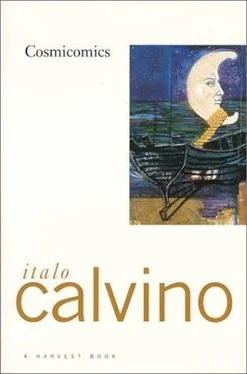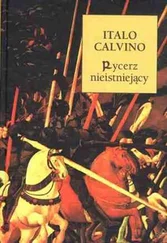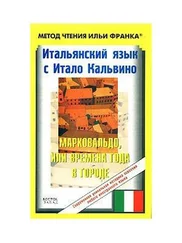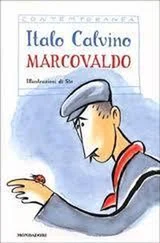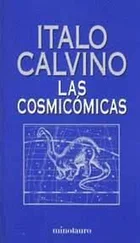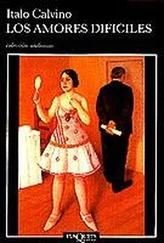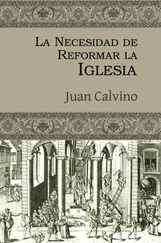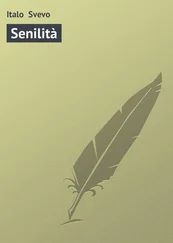I knew her well, in other words. And I wasn't sure of her. Every now and then I was overcome with suspicion, anxiety, rage. I didn't let anything show, you know my character, but beneath that impassive mask passed suppositions I can't bring myself to confess even now. More than once I suspected she was unfaithful to me, that she sent messages not only to me but also to others; more than once I thought I had intercepted one, or that I had discovered a tone of insincerity in a message addressed to me. I was jealous, I can admit it now, not so much out of distrust of her as out of unsureness of myself: who could assure me that she had really understood who I was? Or that she had understood the fact that I was? This relationship achieved between us thanks to the sea water – a full, complete relationship, what more could I ask for? – was for me something absolutely personal, between two unique and distinct individualities; but for her? Who could assure me that what she might find in me she hadn't also found in another, or in another two or three or ten or a hundred like me? Who could assure me that her abandon in our shared relations wasn't an indiscriminate abandon, slapdash, a kind of – who's next? – collective ecstasy?
The fact that these suspicions did not correspond to the truth was confirmed, for me, by the subtle, soft, private vibration, at times still trembling with modesty, in our correspondences; but what if, precisely out of shyness and inexperience, she didn't pay enough attention to my characteristics and others took advantage of this innocence to worm their way in? And what if she, a novice, believed it was still I and couldn't distinguish one from the other, and so our most ultimate play was extended to a circle of strangers…?
It was then that I began to secrete calcareous matter. I wanted to make something to mark my presence in an unmistakable fashion, something that would defend this individual presence of mine from the indiscriminate instability of all the rest. Now it's no use my piling up words, trying to explain the novelty of this intention I had; the first word I said is more than enough: make, I wanted to make, and considering the fact that I had never made anything or thought you could make anything, this in itself was a big event. So I began to make the first thing that occurred to me, and it was a shell. From the margin of that fleshy cloak on my body, using certain glands, I began to give off secretions which took on a curving shape all around, until I was covered with a hard and variegated shield, rough on the outside and smooth and shiny inside. Naturally, I had no way of controlling the form of what I was making: I just stayed there all huddled up, silent and sluggish, and I secreted. I went on even after the shell covered my whole body; I began another turn; in short, I was getting one of those shells all twisted into a spiral, which you, when you see them, think are so hard to make, but all you have to do is keep working and giving off the same matter without stopping, and they grow like that, one turn after the other.
Once it existed, this shell was also a necessary and indispensable place to stay inside of, a defense for my survival; it was a lucky thing I had made it, but while I was making it I had no idea of making it because I needed it; on the contrary, it was like when somebody lets out an exclamation he could perfectly well not make, and yet he makes it, like "Ha" or "hmph!," that's how I made the shell: simply to express myself. And in this self-expression I put all the thoughts I had about her, I released the anger she made me feel, my amorous way of thinking about her, my determination to exist for her, the desire for me to be me, and for her to be her, and the love for myself that I put in my love for her – all the things that could be said only in that conch shell wound into a spiral.
At regular intervals the calcareous matter I was secreting came out colored, so a number of lovely stripes were formed running straight through the spirals, and this shell was a thing different from me but also the truest part of me, the explanation of who I was, my portrait translated into a rhythmic system of volumes and stripes and colors and hard matter, and it was the portrait of her as she was, because at the same time she was making herself a shell identical to mine and without knowing it I was copying what she was doing and she without knowing it was copying what I was doing, and all the others were copying all the others, so we would be back where we had been before except for the fact that in saying these shells were the same I was a bit hasty, because when you looked closer you discovered all sorts of little differences that later on might become enormous.
So I can say that my shell made itself, without my taking any special pains to have it come out one way rather than another, but this doesn't mean that I was absent-minded during that time; I applied myself, instead, to that act of secreting, without allowing myself a moment's distraction, never thinking of anything else, or rather: thinking always of something else, since I didn't know how to think of the shell, just as, for that matter, I didn't know how to think of anything else either, but I accompanied the effort of making the shell with the effort of thinking I was making something, that is anything: that is, I thought of all the things it would be possible to make. So it wasn't even a monotonous task, because the effort of thinking which accompanied it spread toward countless types of thoughts which spread, each one, toward countless types of actions that might each serve to make countless things, and making each of these things was implicit in making the shell grow, turn after turn…
(And so now, after five hundred million years have gone by, I look around and, above the rock, I see the railway embankment and the train passing along it with a party of Dutch girls looking out of the window and, in the last compartment, a solitary traveler reading Herodotus in a bilingual edition, and the train vanishes into the tunnel under the highway, where there is a sign with the pyramids and the words "VISIT EGYPT," and a little ice-cream wagon tries to pass a big truck laden with installments of Rh-Stijl, a periodical encyclopedia that comes out in paperback, but then it puts its brakes on because its visibility is blocked by a cloud of bees which crosses the road coming from a row of hives in a field from which surely a queen bee is flying away, drawing behind her a swarm in the direction opposite to the smoke of the train, which has reappeared at the other end of the tunnel, so you can see hardly anything thanks to the cloudy stream of bees and coal smoke, except a few yards farther up there is a peasant breaking the ground with his mattock and, unaware, he brings to light and reburies a fragment of a Neolithic mattock similar to his own, in a garden that surrounds an astronomical observatory with its telescopes aimed at the sky and on whose threshold the keeper's daughter sits reading the horoscopes in a weekly whose cover displays the face of the star of Cleopatra: I see all this and I feel no amazement because making the shell implied also making the honey in the wax comb and the coal and the telescopes and the reign of Cleopatra and the films about Cleopatra and the pyramids and the design of the zodiac of the Chaldean astrologers and the wars and empires Herodotus speaks of and the words written by Herodotus and the works written in all languages including those of Spinoza in Dutch and the fourteen-line summary of Spinoza's life and works in the installment of the encyclopedia in the truck passed by the ice-cream wagon, and so I feel as if, in making the shell, I had also made the rest.
I look around, and whom am I looking for? She is still the one I seek; I've been in love for five hundred million years, and if I see a Dutch girl on the sand with a beachboy wearing a gold chain around his neck and showing her the swarm of bees to frighten her, there she is: I recognize her from her inimitable way of raising one shoulder until it almost touches her cheek, I'm almost sure, or rather I'd say absolutely sure if it weren't for a certain resemblance that I find also in the daughter of the keeper of the observatory, and in the photograph of the actress made up as Cleopatra, or perhaps in Cleopatra as she really was in person, for what part of the true Cleopatra they say every representation of Cleopatra contains, or in the queen bee flying at the head of the swarm with that forward impetuousness, or in the paper woman cut out and pasted on the plastic windshield of the little ice-cream wagon, wearing a bathing suit like the Dutch girl on the beach now listening over a little transistor radio to the voice of a woman singing, the same voice that the encyclopedia truck driver hears over his radio, and the same one I'm now sure I've heard for five million years, it is surely she I hear singing and whose image I look for all around, seeing only gulls volplaning on the surface of the sea where a school of anchovies glistens and for a moment I am certain I recognize her in a female gull and a moment later I suspect that instead she's an anchovy, though she might just as well be any queen or slave-girl named by Herodotus or only hinted at in the pages of the volume left to mark the seat of the reader who has stepped into the corridor of the train to strike up a conversation with the party of Dutch tourists; I might say I am in love with each of those girls and at the same time I am sure of being in love always with her alone.
Читать дальше
